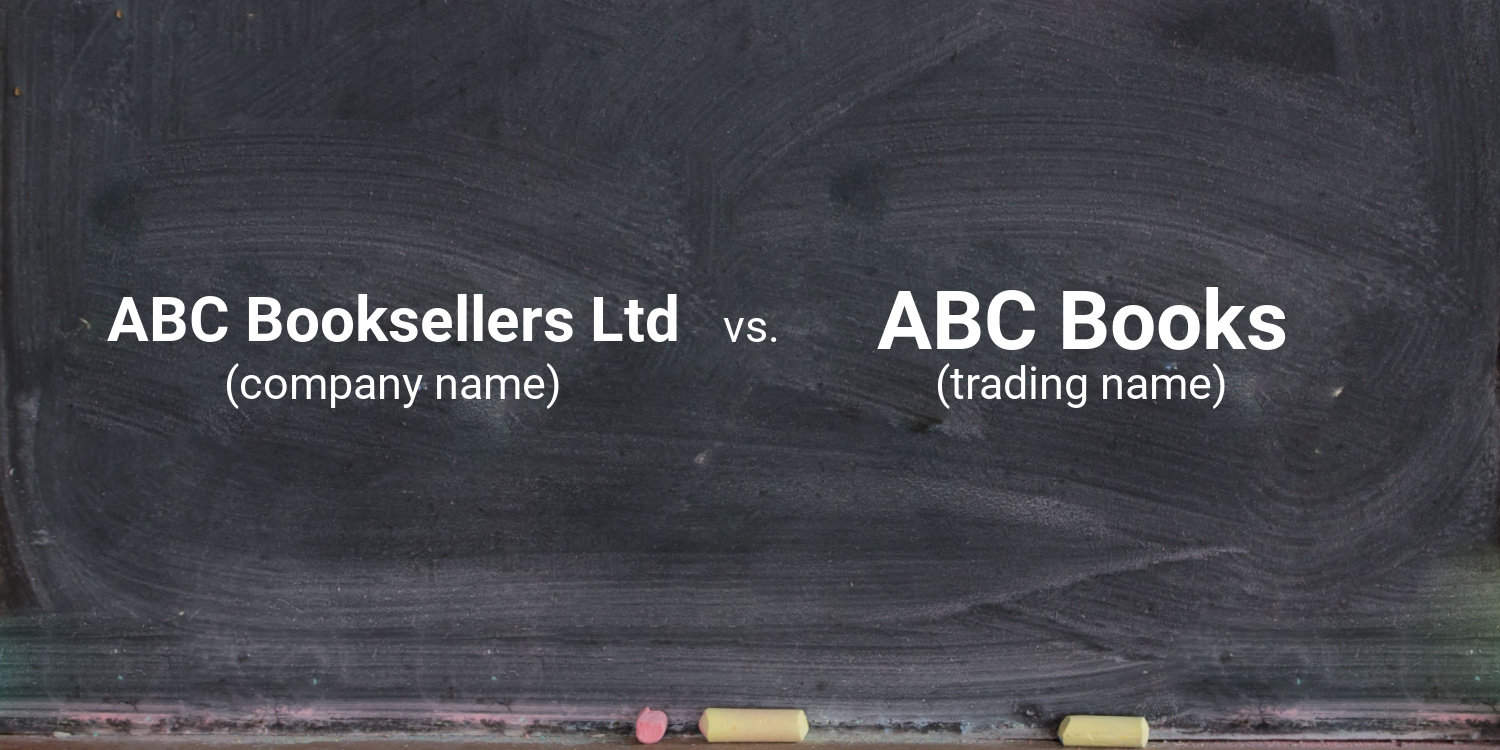Table of Contents
It’s common for a limited company to trade under a different name from its official name. This alternative name is the trading name, and the original name is the company name.
In this article, we look at the difference between the company and trading names, and why using a trading name is popular amongst limited company owners. Let’s get started.
The company name explained
The company name is the name that is used when a company is registered with Companies House. For a company limited by shares or a company limited by guarantee, this will include ‘Limited’ or ‘Ltd’ at the end of the name. A limited liability partnership’s name will end with ‘Limited Liability Partnership’ or ‘LLP’.
This is the name that appears on the company’s Certificate of Incorporation, and then, if the company ever changes its name, the Certificate of Incorporation on Change of Name.
All registered limited company names are displayed on the Companies House register, where they can be freely searched for and viewed by anyone who is interested. The company name must be unique and cannot be too similar to another company on the register. For example, all of the below are too similar to Example Company Name Limited:
- Example Company Names Limited
- Example Company Name + Limited
- Example Company Name UK Limited
When you register a limited company, you are also registering the company name, essentially stopping anyone else from forming another company with that name (or as mentioned, something too similar).
There are some ‘words and expressions’ that cannot be used in a company name without prior approval from an appropriate (normally government-based) body. For example:
- To use the word ‘fund’, permission must be granted by the Financial Conduct Authority
- To use the word ‘King’, permission must be granted by the Cabinet Office
- To use the expression ‘Medical centre’, permission must be granted by the Department of Health
This rule is in place to prevent the public from being misled or harmed by a company.
Even if a company is using a trading name, the company name must still be published in official company literature, including the below:
- Websites
- Invoices
- Receipts
- Letters
- Correspondence with HMRC
- Licence applications
The trading name explained
A trading name (sometimes known as a ‘business name’) is the name a business chooses to trade under when it does not wish to use its company name. Trading names are permitted, and a company can have as many trading names as its owners wish.
You may have noticed something similar to the below on a business’s website or letterhead:
B.Smith Limited trading as Billy Smith Plumbing (the abbreviation ‘T/A’ is sometimes used instead of ‘trading as’)
This means that the company has been officially registered at Companies House as B.Smith Limited, but the owner prefers to use a trading name, which in this case is Billy Smith Plumbing.
Unlike the company name, the trading name does not need to be registered at Companies House or anywhere else for that matter. As this would suggest, there is no register made up of trading names.
Like the company name, there are some rules with regards to what can and can’t be used for the trading name:
- It must not include any suffixes associated with a limited company or limited liability partnership (such as ‘Ltd’, ‘PLC’ or ‘LLP’)
- It must not include any sensitive ‘words and expressions’ (unless the necessary permission is granted)
- It must not be the same as a current trade mark
If you intend to use a trading name, provided that you adhere to the above, you can simply start using it when you are ready. We would, however, suggest that you inform HMRC and your bank of your trading name as soon as possible. This is to help you avoid any tax confusion or payment problems.
Whilst you are free to publish the trading name on your website, letters, and other business materials, you must still use your company name too (generally in a less prominent location such as your website’s footer, for example).
Why do limited companies use trading names?
There are several scenarios where a business owner may choose to use a trading name rather than the official company name:
Multiple services
If a business grows and starts providing new services, the original company name may become outdated and potentially confusing. In this instance, adding new trading names for each new service would help define the different elements of the business, without requiring the registration of new limited companies for the new services (something that could become an administrative burden for the business owner).
A change of direction
A business may have been set up with the intention of providing a very specific service and the company name mirrored this intention. However, the business owner may decide to pivot and change the overall direction of the business, making the old name wholly unsuitable. Again, by using a trading name, the business owner would not need to worry about registering a new limited company.
A business has been acquired
A company may purchase another business, but rather than entirely rebranding the acquired business, the company making the purchase could continue to use the trading name to ensure stability and not risk losing existing customers. Ultimately though, the acquired business sits under the ‘umbrella’ of the limited company.
Rebranding opportunity
It may be that an individual decides that the name that they used when forming the company was actually not appropriate for the business. Whilst changing the company name is possible (and is something that we can help with through our Company Name Change Service), the business owner may simply decide to start trading under a new name.
So there you have it
The company name is the official name of the company, as it was registered at Companies House. The trading name is an alternative name that a business owner may decide to use if they do not wish to use their company name. This could be for a number of reasons, including logistical (new services have been added to the company or a domain name wasn’t available) and practical (the business owner does not like the registered company name anymore).
We hope you have found this article useful. If you have any questions, please leave a comment and we’ll be in touch as soon as possible.














I will like to register an African food store in the UK exporting agricultural products from Nigeria.Can you assist in the formation of the Company name? And what are the licenses required in other to do this kind of exportation business in the UK.
Best Regards
Thank you for your kind enquiry, Banjo.
Unfortunately at present we do not accept orders from Nigeria due to Financial Action Task Force advice that Nigeria is on their ‘grey list’ for anti-money laundering/terrorist financing controls. As we are supervised by HMRC, we have decided not to accept any orders from Nigeria or where trade takes place in Nigeria until this situation changes. We apologise for any inconvenience caused.
With regards to what business licences you require, please take a look at our blog on business licences here: https://www.fatf-gafi.org/en/publications/High-risk-and-other-monitored-jurisdictions/Increased-monitoring-june-2023.html
Kind regards,
The Rapid Formations Team
I’m thinking of doing just this and was wondering about my website. If I create a new one with my new rebranding then I lose the domain to my company name so do people hold onto both domains – company and trading name and ‘use’ their trading name one?
Thank you for your kind enquiry.
Please note that domain names are not technically linked to company names, and domain names only offer protection to a brand if you are in control of the domain name.
We hope this answers your question.
Kind regards,
The Rapid Formations Team